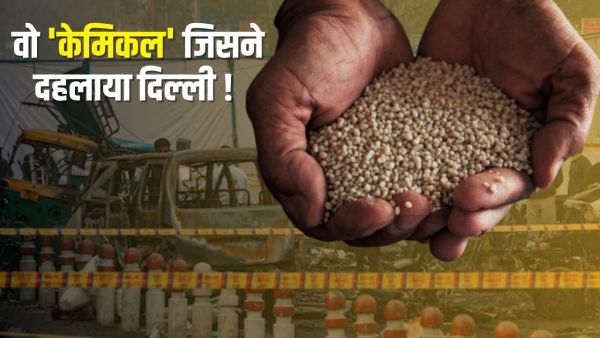
Role of ammonium nitrate in the massive explosion in Delhi!
Delhi Blast: The day of November 10 will be remembered as a deep wound for Delhi. A massive explosion seemed to put a brake on the speed of the capital. Many people lost their lives in this horrific explosion and countless people are hanging between life and death. At the center of this devastation has emerged a name which we and you hear often, but perhaps are not aware of its real power – Ammonium Nitrate. This is the same chemical which is used in everything from agriculture to big mines. But when it is in the wrong hands or used in the wrong way, it becomes a thing of death. The question is, what is this chemical? How big is its business in India?
A 'chemical' that has two faces
It is a strange irony that ammonium nitrate can both give and take life at the same time. It is used in two main forms. First, as a farmer's companion. This is a very important nitrogen rich fertilizer. When farmers put it in the fields, it helps the crops grow faster. It is an essential nutrient for plants.
Its second form is extremely powerful and explosive. Explosives are needed to break rocks in industrial work, such as mining, tunneling or large construction works. Ammonium nitrate is the main raw material of these commercial explosives. When mixed with fuel oil (such as diesel), it forms an extremely powerful explosive mixture called ANFO (Ammonium Nitrate Fuel Oil). Apart from this, it is also used in making fireworks, pesticides and herbicides.
Why is ammonium nitrate so dangerous?
It is important to understand the true nature of ammonium nitrate. It itself is not flammable, but it is an 'oxidizer'. In simple language, it does not burn itself, but helps the fire to burn faster. When it comes in contact with any flammable substance (like oil, wood, cloth) and gets the right temperature or spark, it can cause a devastating explosion. Due to this dangerous nature, terrorist organizations have been misusing it to make Improvised Explosive Device (IED) i.e. homemade bombs. In view of this danger, the Government of India has not allowed it to be sold in the 'open market'. There are very strict rules and regulations regarding this.
1- Ammonium Nitrate Rules, 2012: Under this law, it is mandatory to obtain a license to manufacture, sell, possess, transport or use this chemical.
2- Monitoring of PESO: This license is issued by an organization named Petroleum and Explosives Safety Organization (PESO). It is illegal to possess even a single grain of it without PESO's permission.
3- Strict rules of storage: It cannot be kept in any common warehouse. The rules say that it has to be kept in a fire proof place, where there are strong arrangements to extinguish the fire. For security reasons, it is strictly prohibited to store it at ports.
4- Severe punishment: If any person or company breaks these rules or is caught using ammonium nitrate without a license, he can be punished with jail up to 3 years and a heavy fine under the Explosives Act, 1884.
Which companies manufacture this chemical in India?
After the Delhi incident, it is natural to raise the question that who makes it? It may be surprising to know that the business of ammonium nitrate in India is not small but is worth thousands of crores. According to an estimate, its market in India in 2025 will be worth US $ 1,506.5 million (about Rs 12,500 crore). It is expected that it will reach $2,206.0 million by 2032. Its total production capacity in India is around 10.96 lakh tonnes per year. Many big names are included in the companies making it. Because it is used in both fertilizer and industry, the companies are also divided.
1- Fertilizer giant: Big fertilizer companies like Indian Farmers Fertilizer Cooperative Limited (IFFCO), National Fertilizers Limited (NFL), Coromandel International Limited and Chambal Fertilizers and Chemicals Limited are associated with it.
2- Big players of industrial grade: Deepak Fertilizers and Petrochemicals Corp. Limited (DFPCL) is considered a major producer of technical i.e. industrial grade ammonium nitrate in India. Apart from these, companies like Smartchem Technologies Limited are also active in this field.
Prices also vary according to its grade. While compost grade can be available for ₹ 20 to ₹ 100 per kg, high purity industrial grade can be available for ₹ 100 to ₹ 160 per kg.
-
Novo Nordisk slashes Wegovy prices in India by up to 37% to boost sluggish sales of weight-loss drug

-
Digital media accounted for 97% of ad violations in H1 FY26, illegal betting most violative category

-
Turkish military plane with 20 on board crashes in Georgia

-
Damarchus Inazuma: Scientists have found a new orange and grey spider that is not a male or female

-
West Bengal CM Mamata Banerjee says Atal Bihari Vajpayee’s official birth date was not December 25
